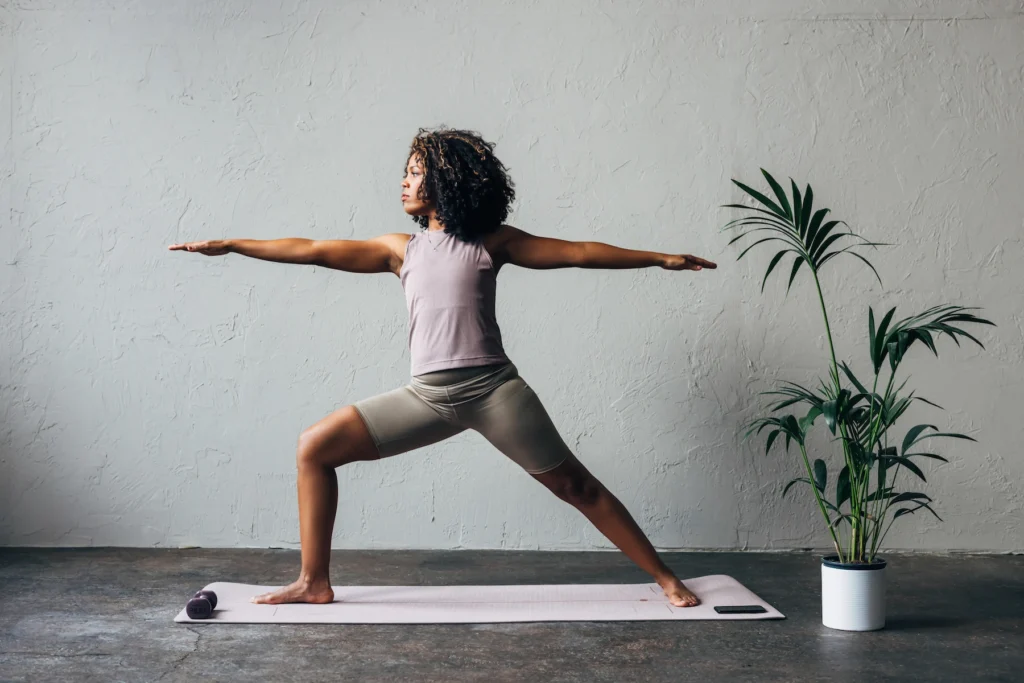Introduction
Athletes constantly seek ways to enhance their performance and extend their careers. One often overlooked tool that can significantly benefit athletes is yoga. With its emphasis on flexibility, strength, and mental focus, yoga offers a comprehensive approach to improving athletic performance and reducing the risk of injury. This blog explores how integrating yoga into an athlete’s routine can yield substantial benefits.
Yoga’s holistic impact on physical health is particularly beneficial for athletes involved in high-intensity sports where the risk of injury is elevated. By incorporating yoga, athletes can develop a stronger core, enhanced flexibility, and improved muscular balance, which are pivotal in maintaining stability and preventing common sports injuries like strains and sprains. Regular yoga practice can also lead to better posture and alignment, reducing the wear and tear on the body associated with repetitive sports movements. Additionally, the breathing techniques learned in yoga help improve oxygenation of the blood, enhancing endurance and recovery times. These physical benefits, coupled with the mental clarity and focus that yoga fosters, make it an invaluable addition to any athlete’s training regimen. Through consistent practice, athletes can not only boost their current performance levels but also pave the way for sustained athletic endeavors with reduced risk of long-term injuries.
The Physical Benefits of Yoga for Athletes

Athletes from various sports constantly seek innovative ways to boost their performance and extend their careers, often turning to rigorous training and advanced technologies. However, one ancient practice, yoga, provides profound benefits that are sometimes overlooked in modern athletic training regimes. Yoga, known for its holistic approach to mind and body wellness, offers a wealth of advantages for athletes looking to enhance their physical capabilities and resilience.
Integrating yoga into an athletic routine can significantly improve flexibility, strength, balance, and injury prevention. These benefits stem from yoga’s unique combination of dynamic and static poses, which stretch and strengthen the body’s connective tissues and muscles. Enhanced flexibility aids in achieving a greater range of motion, crucial for optimal performance in virtually all sports. Moreover, the strength gained from holding yoga poses is functional and evenly distributed, helping stabilize the joints and reduce the risk of injuries. Additionally, the balance and coordination developed through regular yoga practice can give athletes a competitive edge in their specific sports by enhancing their precision and efficiency. Thus, yoga not only complements traditional athletic training but can be pivotal in achieving peak performance and longevity in any sporting career.
1. Increased Flexibility
Yoga stretches the muscles, tendons, and ligaments, which helps athletes maintain or improve their range of motion. This increased flexibility can lead to better performance, as a greater range of motion can enhance the efficiency of movements during sports.
2. Enhanced Strength
Many yoga poses require supporting the body’s weight in various configurations, which builds strength in important but often neglected muscles. This muscular strength is crucial for athletes in sports that require balance and stability, such as soccer, basketball, and gymnastics.
3. Improved Balance and Coordination
Yoga involves a variety of poses that challenge balance. Regular practice helps athletes improve their coordination and stability, which is particularly beneficial in sports that require precise movements and control.
4. Injury Prevention
Yoga’s focus on alignment and controlled movements helps athletes build a stronger body foundation, reducing the risk of injuries. Stretching the muscles can also decrease the chances of strains and sprains.
The Mental Edge
In the high-stakes world of competitive sports, where physical prowess often steals the spotlight, the mental game plays an equally crucial role. Yoga, a practice deeply rooted in ancient traditions, offers athletes a competitive advantage that transcends physical boundaries—The Mental Edge. This dimension of yoga is not just about achieving tranquility; it’s about cultivating mental resilience, focus, and clarity, all essential ingredients for peak performance in any sport.
Yoga’s mental benefits are wide-ranging and profound. Through consistent practice, athletes can develop a sharper focus, control over their emotions, and an improved ability to cope with the pressures of competitive environments. The mindfulness cultivated in yoga practice helps athletes stay present in the moment, a skill that can make the difference between crumbling under pressure and rising to the occasion. Furthermore, the meditative aspects of yoga can aid in stress reduction and anxiety management, offering a sanctuary of calm in the otherwise stormy realm of sports. By integrating yoga into their regular training routines, athletes not only enhance their physical agility and strength but also arm themselves with mental tools that can elevate their performance to new heights.
1. Stress Reduction
Athletic competitions are high-pressure situations where mental clarity can be as crucial as physical ability. Yoga’s meditative elements help reduce stress and anxiety, allowing athletes to remain calm and focused during crucial moments.
2. Increased Concentration
Yoga poses and flows require concentration and mindfulness, which can help athletes maintain focus during long practices or events. This heightened ability to concentrate can translate into better performance in any sport.
3. Mind-Body Connection
Yoga teaches awareness of the body’s sensations and the need for balance and harmony. Athletes who practice yoga often report a better sense of how their bodies function, leading to quicker identification and correction of imbalances before they lead to injury.
Yoga Styles Suited for Athletes
While yoga in general is beneficial for overall well-being, certain styles of yoga are especially advantageous for athletes, tailored to meet their specific needs for strength, flexibility, recovery, and mental focus. Here’s a detailed look at some yoga styles that are particularly suited to athletes and how they can be integrated into a sports training regimen:
1. Ashtanga Yoga
- Description: Ashtanga Yoga is a rigorous, structured practice that involves synchronizing breath with a progressive series of postures—a process producing intense internal heat and a profuse, purifying sweat.
- Benefits for Athletes:
- Builds Core Strength and Stamina: The constant movement from one pose to another enhances endurance and strengthens the body, particularly the core, essential for stability in any sport.
- Improves Flexibility: Regular practice increases flexibility, which can help athletes perform movements more fluidly and with a reduced risk of injuries.
- Enhances Focus: The requirement to focus on breath and movement helps improve concentration, beneficial during high-pressure moments in sports.
2. Iyengar Yoga
- Description: This form of yoga is known for its emphasis on precision and alignment in the execution of postures. Iyengar Yoga often uses props like belts, blocks, and blankets to help hold poses longer.
- Benefits for Athletes:
- Improves Alignment and Technique: Proper alignment not only enhances performance but also reduces the risk of injuries. Athletes can learn to correct postural imbalances that might lead to or exacerbate injuries.
- Develops Mental Discipline: Holding poses for extended periods instills patience and mental endurance, qualities that are beneficial in long-duration sports or activities.
- Tailored for Individual Needs: The use of props makes this style highly adaptable for different needs and fitness levels, allowing athletes to focus on specific areas requiring attention.
3. Restorative Yoga
- Description: Restorative Yoga is a gentle, calming style of yoga that uses props to support the body, allowing it to enter into a state of deep relaxation without strain or pain.
- Benefits for Athletes:
- Promotes Recovery: This style helps lower the heart rate and blood pressure, and promotes deep breathing, all of which facilitate the recovery process after intense physical exertion.
- Reduces Stress and Fatigue: By encouraging relaxation, Restorative Yoga helps mitigate the physical and psychological stress that can accumulate in competitive sports environments.
- Enhances Flexibility Gently: The supportive nature of this yoga allows muscles to stretch gently, which can help maintain or increase flexibility without the risk of injury.
Integrating Yoga into Athletic Training
Integrating yoga into athletic training offers a multidimensional approach to enhancing performance and accelerating recovery. As athletes push their bodies to peak performance, the holistic benefits of yoga—ranging from improved flexibility and strength to enhanced mental focus and stress reduction—can provide a significant edge. This integration not only aids in physical conditioning but also promotes a deeper connection between mind and body, crucial for peak athletic performance. Whether you’re a weekend warrior or a professional athlete, incorporating yoga into your training regimen can help balance the rigors of sports with restorative practices, leading to better overall health and improved athletic outcomes.
- Determine Your Needs: Athletes should assess their physical and mental needs to choose the yoga style that best complements their training. For instance, athletes in high-impact sports might benefit more from Iyengar or Restorative Yoga to counterbalance the intense physical strain.
- Regular Practice: Incorporating yoga 2-3 times per week can help athletes see significant improvements. It’s important to maintain consistency to get the full benefits.
- Combine Styles: It can be beneficial to mix different styles of yoga. For example, integrating Ashtanga for strength and endurance with Restorative Yoga for recovery could provide a balanced approach.
- Consult with Professionals: Working with experienced yoga instructors who understand the unique needs of athletes can help in tailoring the practice to benefit specific sports and activities.
In conclusion, while all forms of yoga offer significant benefits, choosing the right style to match an athlete’s specific needs can optimize their performance and recovery. Whether it’s the intensity of Ashtanga, the precision of Iyengar, or the gentle recovery of Restorative Yoga, there’s a style to complement every athlete’s training regimen.
Conclusion
Yoga offers a holistic approach to athletic training, emphasizing physical and mental disciplines that enhance performance and prevent injuries. By incorporating yoga into their routines, athletes can gain a competitive edge and enjoy longer, more productive careers. Whether you’re a seasoned pro or a weekend warrior, the benefits of yoga can propel you towards your best performance yet.

